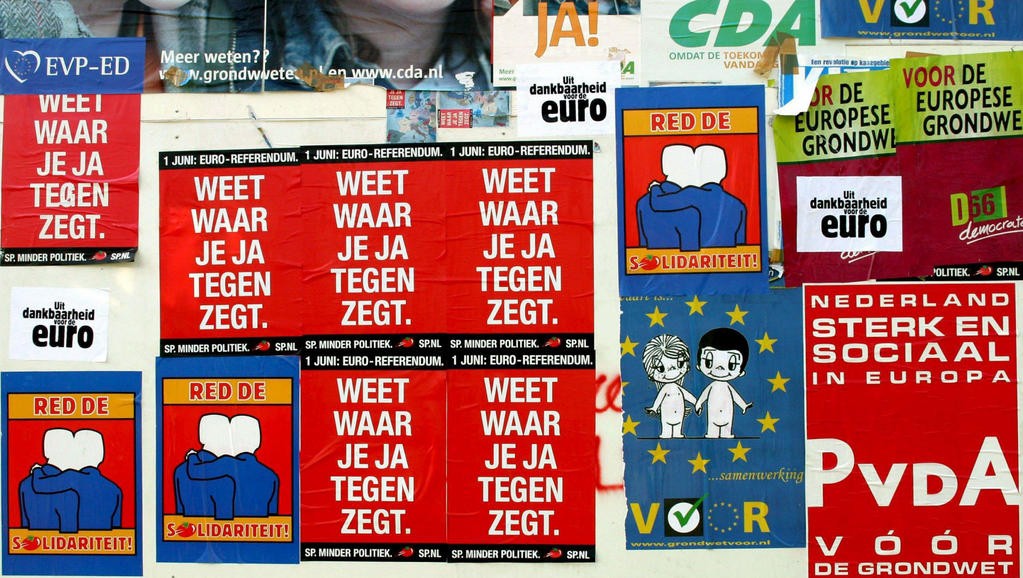After the Vote: Why the Netherlands Accepted the Lisbon Treaty
An interview with David Stolwijk (MA 2021) about his MA Thesis "After the Vote: Why the Netherlands Accepted the Lisbon Treaty, Despite the ‘Nee’ Against the European Constitutional Treaty" (awarded with program distinction)

What is the topic of your thesis?
My research is about the response of the Dutch government to the 2005-referendum on the EU Constitutional Treaty. The proposal - which was the result of 4 years of negotiation between EU Member States - was rejected by 61% of the Dutch voters. Nevertheless, the Netherlands signed the Lisbon Treaty in 2007, a treaty that was almost exactly the same. Or, in the words Valery Giscard d’Estaing, the chair of the Constitutional Convention that drafted the text: “the difference is one of approach, rather than content.”
I was interested in finding out why the Netherlands decided to agree on the Lisbon Treaty, despite the outcome of the 2005-referendum.
Why were you interested in exploring this topic?
The response of the Dutch government to the vote felt counter-intuitive. Why did they support a treaty, the content of which was rejected two years earlier by a significant majority?
Remarkably, after the 2006-referendum on the EU-Ukraine Association Agreement something similar happened in the Netherlands. A 61%-majority voted against the proposal, but later it was adopted nevertheless, only with a ‘explanatory declaration’ added to the treaty.
In comparison, in the UK the Brexit-vote was implemented resolutely, despite only a marginal majority. Only 51.9% of the Britons voted in favor of the UK leaving the EU.
What are your main findings?
To my surprise, I could not find a convincing explanation for this phenomenon in the academic literature. One group of scholars argued that diplomatic pressure ultimately made the government say ‘yes,’ even when the people voted ‘no.’ Another scholar, Schimmelfennig, argued that governments make a cost-benefit analysis after a referendum. If the costs of following a ‘no’ are too high, he argued, governments try to work around it.
Both theories felt unsatisfactory. Indeed, there were many reasons why the Dutch politicians supported both the Constitutional Treaty and the Lisbon Treaty – diplomatic pressure and cost-benefit analyses included – but isn’t a referendum supposed to overrule these reasons?
In my thesis I argue that we can only explain the Dutch post-referendum decision-making if we understand certain distinctive features of the country’s political culture and its conception of democracy.
At the end of the 20th century, the political scientists Arend Lijphart and Hans Daalder concluded that the Netherlands is a textbook example of a consensus-oriented or ‘consociational’ democracy. Unlike the Westminster model of democracy, which is majoritarian, the Dutch system is focused on finding compromises and consensus. Such a political culture is often found in religiously and ideologically fragmented societies where natural majorities are rarely a given. Political elites have to work together to find solutions. To that end, they often depoliticize political issues and end up with complex, technical compromises, in which as many viewpoints as possible are accommodated.
This political culture explains – to a large extent - why the 2005 'no'-vote did not result in a blunt rejection of the Constitution Treaty. More relevant than knowing what a majority doesn’t support is finding out what compromise could gain the support of a broad majority. And thus, the day after the vote politicians started looking for a compromise that could accommodate most of the wishes and concerns of both the ‘yes’ and the ‘no’ voters. They used all the tools that characterize a consociational democracy. For example, various political objections of the 'no'-voters were transformed into technical issues and incorporated into the text that now makes up the Lisbon Treaty. For instance, concerns about the introduction of a European Minister of Foreign affairs – creating the impression of an EU government – were addressed by giving the position a new name: ‘Minister’ became ‘High Representative of the Union for Foreign Affairs and Security Policy’.
Ultimately, government and parliament considered the Lisbon Treaty to be the best possible implementation of the referendum – even while most changes made to the text were only cosmetic. The decision to ratify the Lisbon Treaty did have minimal negative electoral consequences for the political parties involved, which might indicate that it has public support.
What are the implications of your findings?
First of all, these findings allow us to have a more nuanced debate about Dutch post-referendum decision making. Some commentators maintain that the ratification of the Lisbon Treaty was not democratic. We are now able to counter that stance by arguing that it is actually exemplary of how a consociational democracy works.
For people from consensus-oriented democracies, my findings will offer insight into why Brexit really meant Brexit. Why didn’t British politicians try to find a solution that would satisfy both the Remain and the Brexit voters? Because that would be hard to reconcile with the Westminster perspective on democracy.
Interesting, of course, is the normative question: which democratic conception is preferable? The consociational or the Westminster one? Lijphart and Daalder thought differently about this. Daalder was very critical of consensus-oriented democracy. He argued that it could get in the way of major political decisions and lead to radicalization on the fringes of the political spectrum. Lijphart, on the other hand, praised the consociational democratic model for its stability. When we look at the consequences of the government responses to the aforementioned referendums, we find out that both might have been right!
This research is part of the Jean Monnet Module, "Politics in the European Union", which receives funding from the EU. The views expressed in this article are those of the author and do not necessarily reflect the views of the EU Commission.